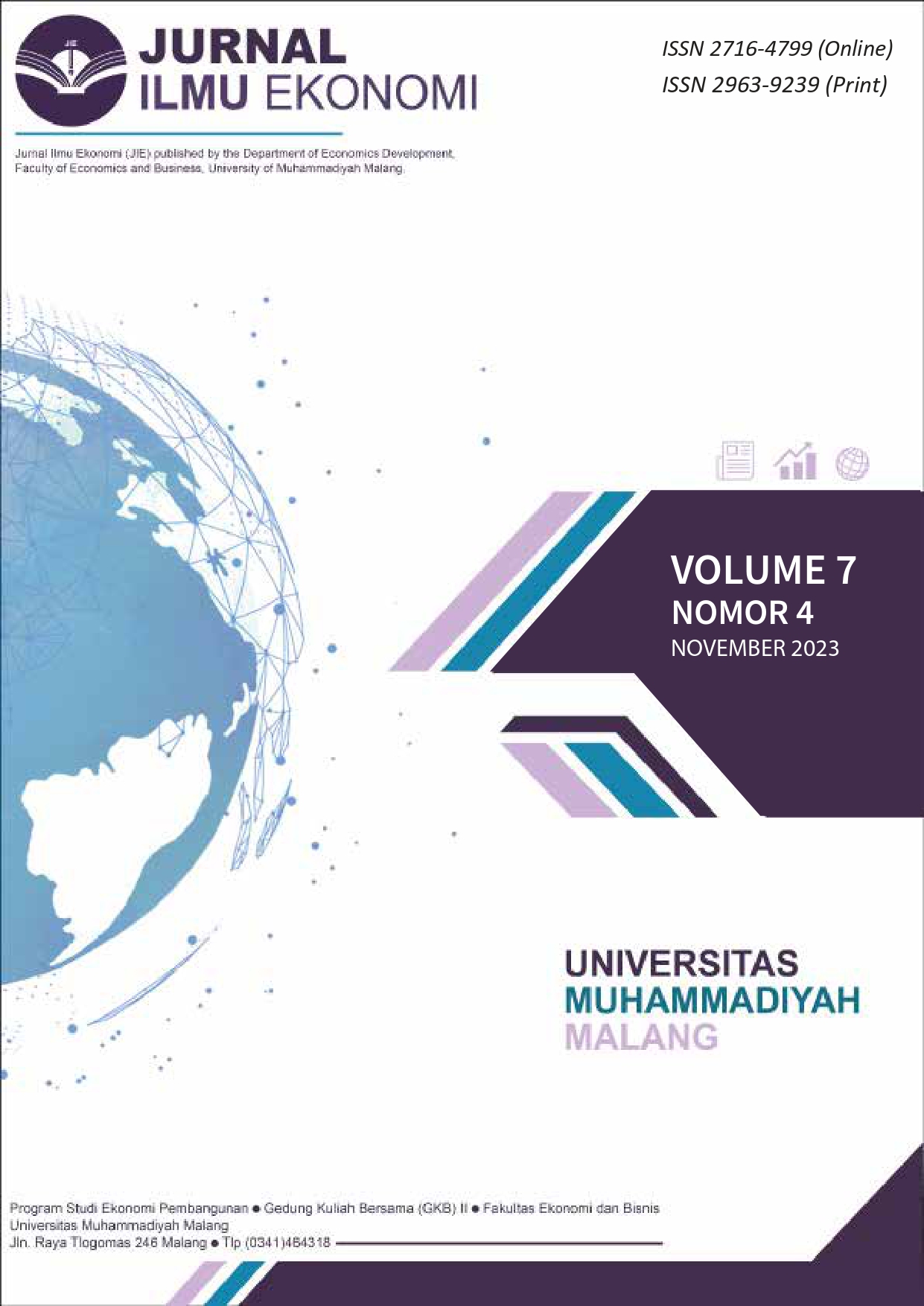Analisis Daya Saing Sektor Ekonomi Unggulan Di Kabupaten Tangerang Tahun 2013-2022
DOI:
https://doi.org/10.22219/jie.v7i04.29417Keywords:
PDRB, SLQ, DLQ, Shift Share, Klassen TypologyAbstract
This research aims to identify and evaluate the key economic sectors with development potential in the second-level region of Tangerang during the period 2011-2022. The research conducted is of a descriptive nature, utilizing ADHK GDP distribution data. Data analysis is performed through the employment of Tipology Klassen, Shift Share, SLQ, and DLQ methods. The research findings indicate that, during the period from 2013 to 2022, three sectors experienced significant growth, namely Agriculture, Forestry, and Fisheries, Manufacturing Industry, and Electricity and Gas Supply. Furthermore, the Shift Share analysis identified that the Wholesale and Retail Trade sector exhibited a high level of competitiveness during the same period. The combined analysis of SLQ and DLQ during the same period revealed that the leading economic sectors in the second-level region of Tangerang are Construction and Financial and Insurance Services.
Penelitian ini bertujuan untuk mengidentifikasi dan mengevaluasi sektor ekonomi utama yang memiliki potensi pengembangan di Kabupaten Tangerang dalam periode 2011-2022. Jenis penelitian yang digunakan adalah penelitian deskriptif, dengan menggunakan data distribusi PDRB ADHK. Analisis data dilakukan dengan menggunakan metode Tipologi Klassen, Shift Share, SLQ, dan DLQ. Hasil penelitian menunjukkan bahwa dalam periode 2013-2022, ada tiga sektor yang mengalami pertumbuhan signifikan, yaitu Pertanian, Kehutanan, dan Perikanan, Industri Pengolahan, serta Pengadaan Listrik dan Gas. Selain itu, analisis Shift Share mengidentifikasi bahwa sektor Perdagangan besar dan eceran memiliki tingkat daya saing yang tinggi dalam periode yang sama. Hasil gabungan analisis SLQ dan DLQ dalam periode yang sama mengungkapkan bahwa sektor ekonomi unggulan di Kabupaten Tangerang adalah Konstruksi dan Jasa Keuangan serta Asuransi
Downloads
References
Astuti, S. T., & Hidayat, W. (2021). Analisis Sektor Ekonomi Unggulan Kabupaten Bangkalan. Jurnal Dinamika Ekonomi Pembangunan, 4(2), 488–495. https://doi.org/10.33005/jdep.v4i2.306
Dewandaru, B., Sudjiono, S., Purnamaningsih, N., & Susilaningsih, N. (2022). Pengaruh Sektor Industri Pengolahan Terhadap PDRB Kabupaten Kediri Periode Tahun 2015-2019. Jurnal Pendidikan Ekonomi (JUPE), 10(2), 108–113. https://doi.org/10.26740/jupe.v10n2.p108-113
Djadjuli, R. D. (2018). Peran Pemerintah Dalam Pembangunan Ekonomi Daerah. Jurnal Dinamika: Jurnal Ilmiah Ilmu Administrasi Negara, 5(2), 8–21. https://jurnal.unigal.ac.id/index.php/dinamika/article/view/1409
Hajeri, Yurisinthae, E., & Dolorosa, E. (2015). Analisis Penentuan Sektor Unggulan Perekonomian di Kabupaten Kubu Raya. 4(2), 253–269.
Hidayat, M., Lapeti, S., & Aqualdo, N. (2011). Analisis Faktor-Faktor Yang Mempengaruhi Pertumbuhan Ekonomi Kota Pekanbaru. Jurnal Sosial Ekonomi Pembangunan, 2(4), 48–63.
Jannah, D. M., & Nugroho, L. (2019). Strategi Meningkatkan Eksistensi Asuransi Syariah di Indonesia. Jurnal Maneksi, 8(1), 169–176.
Kurniawan, M. S., Sudarti, & Arifin, Z. (2017). Analisis Potensi Struktur Ekonomi Unggulan dan Daya Saing Sub Sektor Pertanian di Kota Batu Tahun 2011-201. Jurnal Ilmu Ekonomi, 1(4), 416–429.
Mujiraharjo, F. N. (2017). Analisis Daya Saing Potensi Unggulan Kabupaten Sleman. Teknoin, 23(1), 49–55. https://doi.org/10.20885/teknoin.vol23.iss1.art6
Pantow, S., Palar, S., & Wauran, P. (2015). Analisis Potensi Unggulan dan Daya Saing Sub Sektor Pertanian di Kabupaten Minahasa. Jurnal Berkala Ilmiah Efisiensi, 15(04), 100–112.
Satria, B. T. W. (2016). Analisis Pertumbuhan Ekonomi Dan Penetapan Sektor Unggulan Di Provinsi Jawa Timur Wilayah Timur Tahun 2010-2014. Applied Microbiology and Biotechnology, 14(2), 161–177.
Sharazati, K., Primandhana, W. P., & Wahed, M. (2021). Analisis Sektor Unggulan Di Kabupaten Sleman Dan Kabupaten Gunungkidul. Frontiers in Neuroscience, 3(6), 1–13.
Soleh, A. (2015). Pertumbuhan Ekonomi Dan Kemiskinan Di Indonesia. EKOMBIS REVIEW: Jurnal Ilmiah Ekonomi Dan Bisnis, 2(2), 197–209. https://doi.org/10.37676/ekombis.v2i2.15
Tutupoho, A. (2019). Analisis Sektor Basis Dan Sektor Non Basis Terhadap Pertumbuhan Ekonomi Di Provinsi Maluku (Studi Kasus Kabupaten Kota). Jurnal Cita Ekonomika, 13(1), 1–18. https://doi.org/10.51125/citaekonomika.v13i1.2647
Vikaliana, R. (2017). Analisis Identifikasi Sektor Perekonomian Sebagai Sektor Basis Dan Sektor Potensial Di Kota Bogor. Transparansi Jurnal Ilmiah Ilmu Administrasi, 9(2), 198–208. https://doi.org/10.31334/trans.v9i2.24
Wahyuningsih, W. S. (2015). Analisis Daya Saing Sektor Ekonomi Unggulan Di Jawa Tengah. Economics Development Analysis Journal, 4(3), 332–349.
Wiguna, I. M. G. S., & Budhi, M. K. S. (2019). nalisis Sektor Unggulan Dan Potens Pertumbuhan Ekonomi di Kabupaten Badung Tahun 2012-2016. E- Jurnal Ekonomi Pembangunan Universitas Udayana, 8(4), 810–841.
Downloads
Published
How to Cite
Issue
Section
License
Copyright (c) 2023 Prabowo, Y

This work is licensed under a Creative Commons Attribution-NonCommercial-ShareAlike 4.0 International License.
Authors who publish with this journal agree to the following terms:
- For all articles published in the JIE (Jurnal Ilmu Ekonomi), copyright is retained by the authors. Authors give permission to the publisher to announce the work with conditions. When the manuscript is accepted for publication, the authors agree to the automatic transfer of non-exclusive publishing rights to the publisher.
- Authors retain copyright and grant the journal right of first publication with the work simultaneously licensed under a Creative Commons Attribution-NonCommercial-ShareAlike 4.0 International License that allows others to share the work with an acknowledgement of the work's authorship and initial publication in this journal.
- Authors are able to enter into separate, additional contractual arrangements for the non-exclusive distribution of the journal's published version of the work (e.g., post it to an institutional repository or publish it in a book), with an acknowledgement of its initial publication in this journal.
- Authors are permitted and encouraged to post their work online (e.g., in institutional repositories or on their website) prior to and during the submission process, as it can lead to productive exchanges, as well as earlier and greater citation of published work (See The Effect of Open Access).
This is an open access article and licensed under a Creative Commons Attribution-NonCommercial-ShareAlike 4.0 International License








